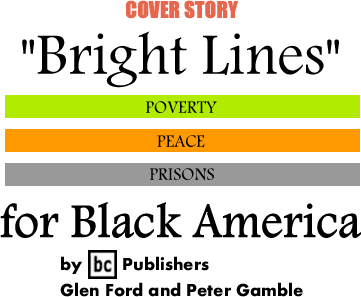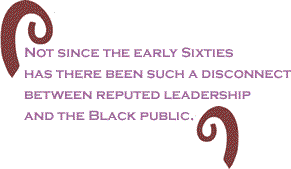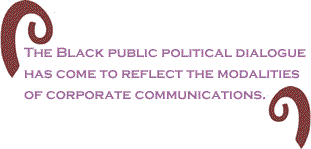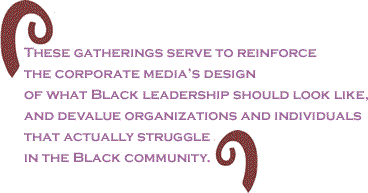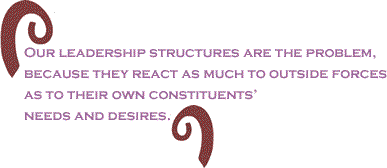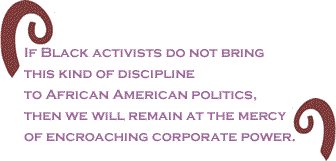
|
|||||||||||||||||||||
|
|
There is nothing clearer than the need for "bright lines" to guide and delineate Black political conduct in America. The cumulative processes of corporate consolidation and concerted efforts to co-opt some Black leadership, while creating phony "alternative" African American leaderships answerable to the corporate class, have created a crisis that almost precludes Blacks from recreating their own historical narrative of reality. We are being robbed of our history and, therefore, our ability to analyze and act on current realities. To an alarming extent, the Black public political dialogue has come to reflect the modalities of corporate communications - the same modalities that obtain in the Republican Party and the more backward elements of the Democratic Party. Corporations excel in erasing history - even yesterday’s history - and substituting another version of reality: the "new" and "better" brand. We see these mechanisms relentlessly at work in the systematic separation of Black "leaders" from the African American public and their immediate concerns. Not since the early Sixties has there been such a disconnect between reputed leadership and the Black public. The crisis is made more complicated by the historical current of Black thought that revels in the display of Black faces in high places. Now that white corporate elites have overcome their previous reflexive aversion to association with such faces - a post-Sixties development, and one that matured only in the mid-Nineties - there is an alluring display of Blacks whose faces have been placed in high profile places by corporations and their media. But what are they saying?
African Americans over the generations have become conditioned to listening respectfully to "prominent" members of The Race. However, in the current era "prominence" and the veneer of legitimacy is conveyed by corporate media, eager to reshape Black leadership and public perceptions of Black-white realities. They are manufacturing Black leadership and distorting the relationship between Black institutions and their mass base of constituents - and the masses know it. Disillusion and disaffection from "politics" as defined by the corporate media and acted out by reputed Black leaders, daily diminishes the willingness of grassroots African Americans to participate in organized activity. And who can blame them? We must challenge the entire edifice of corporate Black leadership-creation, which is a function of finance and media. Yet that cannot occur unless activists return to the basics: What we believe, and What we demand. "Bright lines" must be drawn, to sort out the panoply of actors that are paraded before our eyes and ears. This is an internal struggle and challenge for Black America, since African American institutions have also been infected and deformed by the corporate media virus. They, too, seek authenticity from sources other than their own. Black Leadership Apes White Media There is an historical Black consensus on social justice, peace, and human advancement. It is shared by the vast majority of African Americans, and is decidedly left-wing, by American standards. (See BC, "Where the Left Lives," October 6, 2005.) The University of Chicago’s Professor Michael Dawson, the nation’s preeminent Black demographer, describes most African Americans as behaving politically much like "Swedish Social Democrats." Yet Black political gatherings and so-called "news" programs insist on creating a "balance" of political forces that does not exist in Black America - aping white corporate media such as the New York Times.
For example, Armstrong Williams, the (finally) discredited so-called political commentator - actually, a subsidized shill for the Hard White Right - was for years a fixture on the syndicated TV show "America’s Black Forum." Ostensibly, Williams was placed there to "balance" the views of NAACP Chairman Julian Bond and commentator Julianne Malveaux - whose opinions generally matched those of most of Black America. Armstrong Williams represents a statistically negligible segment of African American opinion - about 2 percent, according to Professor Dawson. Yet, there was Armstrong Williams, every week, giving the Black and white public the impression that he spoke for a significant section of African Americans.
False Unity, with the Wrong People The deepest current in Black America is the imperative to unity. In fact, African Americans are overwhelmingly united on issues of peace, social justice and mobility, and the obligation of government to ensure that inequalities are eliminated. There are no data that indicate a sea change in Black public opinion on these fundamental issues, despite the vast changes in socio-economic stratification among African Americans over the past four decades. Actual unity is not the problem; African Americans are politically the most unified group in the nation, and possibly, in the entire African diaspora. Our leadership structures are the problem, because they react as much to outside forces as to their own constituents’ needs and desires. These forces are overwhelmingly corporate, and they have used their money and muscle to intrude on the internal dialogue of Black America. In the last decade or so, the pressures of white corporate money have increased exponentially, creating great fissures in Black institutional structures - outside of Black popular circles of discussion. A huge wedge has been driven between the people and their assumed leaders, many of whom see great value in association with Blacks who are embedded in Wall Street - which drives and finances gentrification and the impoverishment of the great mass of African Americans. In a larger sense, the integration of modest numbers of Blacks into the corporate class, where they pursue both their own and their companies’ interests, has caused great confusion among presumed Black leaders, who would prefer to interact with the few Blacks in the enemy camp rather than fight the enemy.
Let us be clear: you cannot unite with the enemy and fight it at the same time - even if the face that is presented is Black. It is what BC editor Bruce Dixon calls "the Black-business leadership class" that has caused this consternation and confusion, as they seek to integrate their dreams with corporate America’s schemes, which are antithetical to the interests of Black America. When they call for Black "unity," it resonates, as it always has, among our people. But, unity with whom? For what reason? Under what program, and for whose purpose? "Unity" of this kind defeats us, totally, because it is not unity of the Black polity, which has long been unified on fundamental issues, but unity with surrogates for those who hold none of our essential values, and will continue to work against our interests. Drawing the Lines None of this rot and mess can be resolved unless "bright lines" of political behavior, based on broadly held Black opinion, are held aloft as benchmarks that any aspirant to leadership must address. The CBC Monitor has begun this task with the Congressional Black Caucus, which has allowed itself to be destroyed as "the conscience of the Congress" by a futile quest for unity while infested with corporate surrogates who will not unite with the historical Black consensus. The result has been that the Caucus cannot take a position that the (distinct minority) corporate-bought members oppose. The CBC Monitor has created a score card that penalizes members’ for their most egregious votes against the interests of their people. However, the Monitor will have to go further, and give guidance and warning to the 43 members of the Caucus about the allowable limits of their future behavior. They will have to declare What we believe, and What we demand from our legislators.
BC introduced the "bright line" concept of Black political evaluation in our four-week interrogation of then-Senatorial candidate Barack Obama, back in June of 2003. Obama had seemed to be having dalliances with the rightist Democratic Leadership Council, so we asked him point blank to respond to three "bright line" questions to assure our readers that he had not crossed those lines:
Senator Obama answered all three questions correctly at the time, but has since looked more and more like a DLCer (see BC, "Obama Mouths Mush on War," December 1, 2005), and will be judged accordingly. However, the "bright lines" that we delineated were not comprehensive enough to judge a broad range of political behavior. Such lines must demand that politicians answer direct questions on gentrification, mass Black incarceration, the need for a truly universal health care system, the right to employment at a living wage or government support at a level that can sustain families, and an end to U.S. aggression against peace in the world. We at BC could construct our own manifesto - our list of What we believe, What we demand. But that’s not our job. It’s yours. If Black activists do not bring this kind of discipline to African American politics, then we will remain at the mercy of encroaching corporate power. And they have their own manifesto. BC Publishers Glen Ford and Peter Gamble are writing a book to be titled, Barack Obama and the Crisis in Black Leadership. |
|
| Home | |
Your comments are always welcome. Visit the Contact Us page to send e-Mail or Feedback or Click here to send e-Mail to [email protected] e-Mail re-print notice
If you send us an e-Mail message we may publish all or part of it, unless you tell us it is not for publication. You may also request that we withhold your name. Thank you very much for your readership. |
|
| March
9, 2006 Issue 174 |
||||||||||||||
|
||||||||||||||
|
||||||||||||||
| Printer Friendly Version in Plain Text or PDF format. Download free Adobe Reader. | ||||||||||||||
 |
||||||||||||||
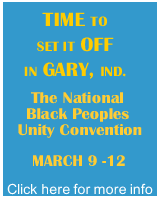 |
||||||||||||||
 |
||||||||||||||
 |
||||||||||||||
| |
||||||||||||||
| |
||||||||||||||






















